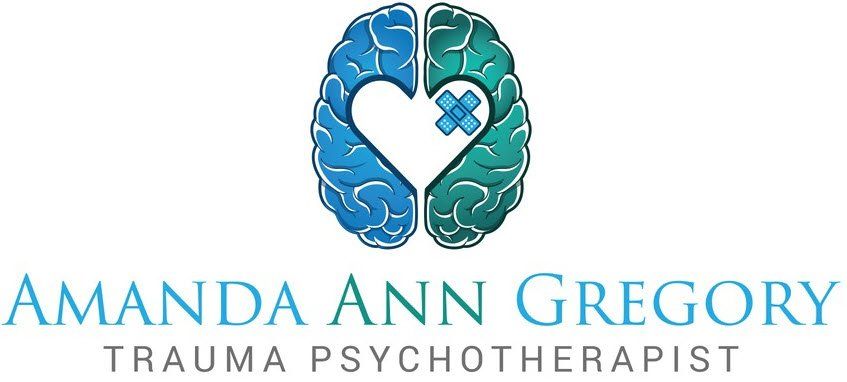Trauma Recovery Doesn’t Require Forgiveness
Amanda Ann Gregory, LCPC, EMDR Certified Therapist
“Forgiveness is for you, not the other person”
“Don’t let someone rent space in your head.”
“You need to forgive so that you can move on.”
Have you heard any of these popular sayings? Do you believe them? When it comes to recovering from trauma, perhaps you shouldn't.
Forgiveness is potentially problematic when incorporated into trauma treatment. It’s been said that forgiveness can help survivors to “move on” or “let go” from the pain of their past. Some believe that you must forgive those who caused or contributed to your trauma in order to recover. Yet, there is no statistical evidence that suggests that this is true.
After more than a decade as a trauma psychotherapist, I’ve witnessed the benefits of forgiveness for many of my clients. However, I do not believe that forgiveness is required in order to recover from trauma, as I’ve treated many trauma survivors who've experienced recovery without forgiving their abusers. Furthermore, I’ve learned that mandating or encouraging forgiveness can be detrimental to trauma survivors and create obstacles in their recovery.
Here are reasons why forgiveness should not be imposed in the process of trauma recovery.
- Forgiveness diminishes harms and wrongs, which inhibits safety
Imagine you are told that you must forgive someone who has harmed you. It does not matter what the situation was or its impact on you; you must forgive them. When you seek social support, you are being told things such as, “that was years ago, let it go,” and “you shouldn’t feel angry, move on.” These messages demonstrate a lack of acceptance and even empathy on the part of those who express them, and may cause you to feel as though your perceptions, emotions, and experiences are illegitimate, false, or misdirected; they might suggest that your pain or well-justified anger is simply less important than your ability to forgive your abuser. Acceptance is an important ingredient to fostering and maintaining safety for trauma survivors, and safety is required in order to recover and process trauma. A failure or refusal to accept and affirm trauma survivors’ lived experiences creates environments and relationships that are detrimental to their ability to recover or truly “move on.”
2. Forgiveness focuses on the abuser instead of the survivor
"Trauma recovery ought to focus on the survivor's relationship with themself."
“Forgiveness is for you - not the other person,” is a popular, well-intended saying. However, such a cliché doesn’t translate well to trauma recovery, as forgiveness focuses on the relationship that the survivor has with their abuser. In contrast, trauma recovery ought to focus on the survivor's relationship with themself. Trauma treatment is focused on the survivor's individualized needs and internal processes. If a survivor has any type of relationship with their abuser, this relationship is addressed, but it is addressed from the needs and best interests of the survivor. Some survivors may benefit from forgiving their abusers, but others either may not derive such a benefit from forgiveness, or may in fact feel the need to withhold forgiveness, and both kinds of attitudes need to be received with equal respect and empathy. Moralistic attitudes to the contrary are not only counter-therapeutic, they tend to center the abuser at the expense of the victim, implying that the onus for righting a past wrong is to be shouldered by the latter, not the former, and in some cases even suggesting that a failure to extend forgiveness is itself a wrong, thus shifting attention and blame away from the real wrong that was the perpetration of the trauma itself.
3. Forgiveness blames survivors, perpetuating shame
Shame is often created or validated by trauma. Survivors often believe that they are “unlovable,” not “good enough,” “stupid,” “incapable,” “weak,” “bad,” or that they cannot safely exist in the world. In short, survivors often blame themselves for their own traumas, and a heavy-handed emphasis on the value of forgiveness contributes to a culture of victim-blaming that many survivors have unfortunately internalized. Requiring a trauma survivor to forgive their abuser can be perceived as the survivor being blamed for the actions of their abuser, or in some cases as suggesting a false equivalence between the wrong perpetrated by the abuser and the supposed “wrong” of the survivor failing or refusing to forgive their abuser, and this exacerbates feelings of shame and does more to center abusers than it does to center the standpoints of survivors. Consider this: A child believes that they are a “bad” kid because their mother yells and punches them. As an adult they believe that they are a “bad person,” which has a negative impact on their self-worth and relationships. Then, a relative says, “That was years ago, you should forgive her.” If this adult cannot forgive (which is common when trauma experiences are unprocessed), this inability serves as further validation that they are indeed a “bad person.”
4. Forgiveness encourages silence
"A heavy-handed emphasis on the value of forgiveness contributes to a culture of victim-blaming that
many survivors have unfortunately internalized."
When you forgive someone, you often don’t perceive the need to discuss or process the situation further. Consider a situation in which you have truly forgiven someone. How often do you need to discuss this incident with them or with yourself? It tends to be rare. In fact, one common sign that you have actually not forgiven someone is your need to continue to discuss the incident(s). As a result, forgiveness often carries an expectation of ourselves and of others that there won’t be a need for much discussion about the topic going forward, and may instill a false sense of reconciliation or closure. Trauma survivors need to be able to disclose and share their trauma narratives as often as needed, as this is a vital part of recovery. When we are pressured to forgive, we may feel as though we need not or should not continue to share or explore our narrative, which inhibits our ability to process and recover. Furthermore, forgiveness can inhibit survivors' ability or willingness to report perpetrators, since seeking judicial accountability, vindication, or punishment is often seen as contrary to the “spirit” of forgiveness.
5. Forgiveness can be used as a means to avoid recovering
Forgiveness can be the path of least resistance, which isn’t always a good thing. Trauma treatment is emotionally and at times physically painful. In order to avoid the pain of processing trauma, you might force yourself to forgive your abuser in the hopes that the impact of the trauma will dissipate. Yet, the relief that is experienced is usually temporary (if any comes at all). As Dr. Rosenna Bakari writes, “Trying to stop pain by forgiveness is like putting a box of cake mix in the oven and expecting to get a cake. That does not work, and you could burn down your house.” In short, you have to mix in ingredients before you attempt to bake your cake, and trauma recovery involves many painful ingredients such as experiences of intense grief, anger, shame, fear, and uncomfortable body sensations.
6. Forgiveness has ties to religious/spiritual groups, isolating some survivors
There are many religious and spiritual ideologies that promote the value of forgiveness, and some groups require their followers to practice forgiveness in order to adhere to their philosophy and teachings. Trauma survivors who are religious or spiritual may feel isolated if they cannot forgive their abusers. They may struggle to reach out to others in their support system who share their religious or spiritual beliefs for fear of being judged. Moreover, survivors who do not identify as religious or spiritual, or who may be actively irreligious or secular in their worldview, may feel isolated due to the pervasive cultural influences and pressures that such religious frameworks exert on them and others, frameworks that may have contributed to their trauma in the first place.
To clarify, I’m not arguing that forgiveness should not be used in trauma recovery. In fact, many survivors have benefited from forgiving their abusers, and I have observed such benefits firsthand. My point is that forgiveness should not be regarded as a compulsory component of any trauma-recovering process, or as a pre-requisite for “moving forward.” I’ve noticed that when forgiveness is needed, it occurs naturally in the treatment process, without having to be forced or encouraged. I’ve observed many trauma survivors who never forgive their abusers and yet achieve successful trauma recovery, which they report leaves them with a sense of peace and hope for the future.
Amanda Ann Gregory is a trauma psychotherapist, national speaker, and author who provides specialized speaking engagements for conferences, companies, and communities. Schedule a speaking engagement and follow on Instagram, Facebook, or YouTube.
PTSD, Posttraumatic Stress Disorder, Complex Trauma, Developmental Trauma, Religious Trauma, Attachment, Children, Teens, Mental Health, Speaker
Bakari, R (2020) Forgiveness is the wrong response to trauma. Medium. Blog post.

All Rights Reserved | Amanda Ann Gregory, LCPC
Design & Consultation by Teresa Lauer, LMHC, GrowYourTherapyPractice.com *

